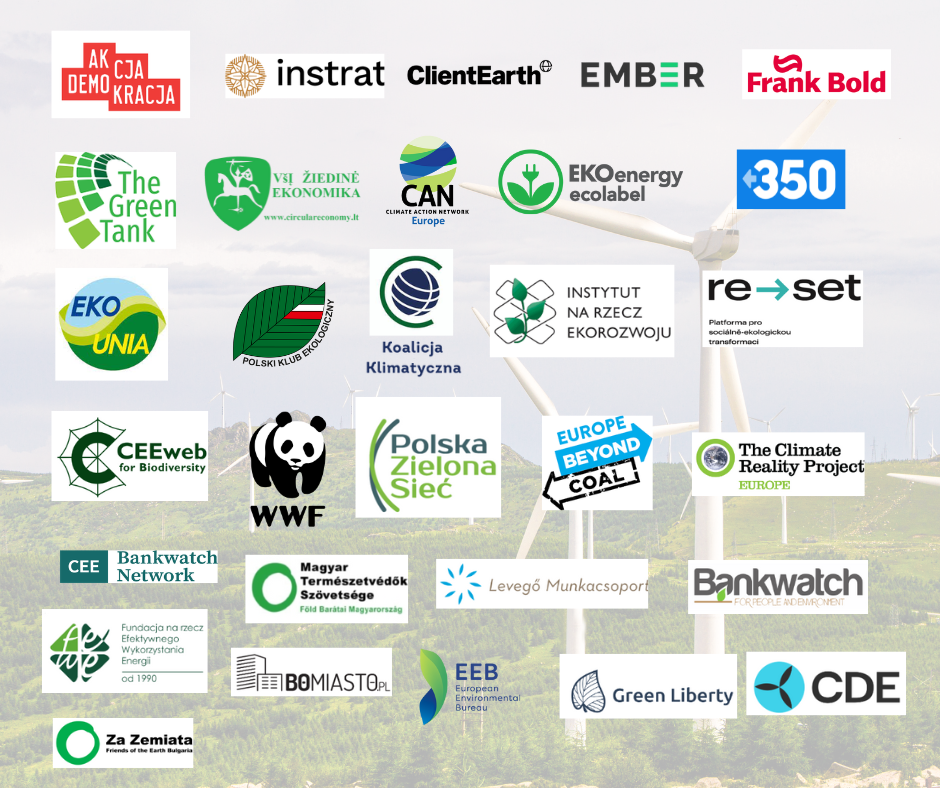To: Frans Timmermans, Executive Vice-President, European Green Deal
To: Ditte Juul-Jorgensen, Director General for Energy of the European Commission
To: Céline Gauer, Director General of the Recovery and Resilience Task Force
Cc: Diederik Samsom, Head of the Cabinet of Executive Vice-President Frans Timmermans
RE: Civil society organisations open letter – Urgent intervention needed on Polish onshore wind regulation reform
9th February 2023
Dear Vice-President Timmermans
Dear Director General Gauer
Dear Director General Juul-Jorgensen
Dear Mr Samsom,
As Polish civil society, with the support of a further 20 organisations in Europe, we are writing to you with regards to Poland’s restrictive onshore wind regulation – the “Act on Investments in Wind Farms” which is currently being reformed as promised by the Polish government in its Recovery and Resilience Plan as one of the milestones.
Since its introduction in 2016, the infamous regulation has blocked 99.7% of the Polish territory from onshore wind investments and become an iconic regulatory barrier to onshore wind energy in Europe. The Act on Investments in Wind Farms provides an opportunity to invest in the onshore wind, but under such strict conditions (“10H rule”) that in fact make it impossible due to physical and urban conditions. The “10H” rule imposes a minimum offset distance between settlements and wind turbines of 10 times the height of the turbine, corresponding to over 2000 metres, 4 times more than the typical value of 500 metres in most European countries.
Polish policy makers finally put their long awaited amendments on the table with a proposal of 500 metres minimum offset distance that would replace the “10H” rule. If accepted, such an amendment would mean that 7.08% of the Polish territory would be available for wind energy investments (in comparison to 0.28% under the “10H” rule). Last week however, within the legislative process in the Polish Parliament, a further proposal was made that controversially increased the minimum offset distance from 500 to 700 metres which is definitely not enough under current geopolitical conditions, in the times of energy price crises, and the EU 2030 climate and energy goals: between 500 and 700 metres is not just 200 metres difference, it is a dramatic change with serious consequences for the EU climate and energy targets, the Polish economy, and energy security.
- It would cause a 44% increase in Polish territory excluded from onshore wind development in comparison to 500m. With each single metre of the area reduced for available wind energy development, costs of imported fuels, such as fossil gas, increase, thus negatively influencing Polish energy security as well as energy prices for consumers.
- Because of project development times, no more than 4 gigawatts of new wind capacity will be built by 2030 if the agreed 500m distance is changed. The existing project pipeline was prepared for 500m, allowing for the rapid commissioning of new wind farms within 2-3 years from now. This is an opportunity to build over 10 GW of new onshore wind farms by 2030 (reaching 18-19 GW), i.e. more than doubling the current Polish installed capacity.
- An increase in the setback distance sabotages the current project pipeline, requiring new wind farms to be designed from scratch and resulting in 6-7 year delivery times. This limits the expected 2030 onshore wind capacity to 11-12 GW. Modelling studies from the European Commission and other institutions show that aligning with GHG 55% targets requires 17-27 GW of onshore wind in Poland by 2030, which is only possible if the current 500m-compatible project pipeline is allowed to be commissioned.
We call on the European Commission to urgently intervene so that the Polish policy makers stick to keeping 500 metres minimum offset distance in the ongoing reform of the “10H” regulation, as required by the Commission to unblock the EU Recovery funds. Without setting the minimum distance to 500 metres, Poland will likely compromise 2030 climate and energy targets for the whole EU and disrupt Europe’s efforts to secure energy supply.
Yours sincerely,
Chiara Martinelli, Director, Climate Action Network (CAN) Europe
On behalf of the signatory organisations:
Piotr Cykowski, Climate Campaign Coordinator, Akcja Demokracja,
Michał Hetmański, CEO, Instrat
Dr Paweł Czyżak, Senior Energy & Climate Data Analyst, Ember
Anna Frączyk, Lawyer, Fossil Fuel Infrastructure, ClientEarth
Bartosz Kwiatkowski, Director, Frank Bold Foundation
Nikos Mantzaris, Senior Policy Analyst & co-Founder, The Green Tank
Domantas Tracevičius, Director, VšĮ “Žiedinė ekonomika”
Steven Vanholme, Programme Manager, EKOenergy Ecolabel
Nick Bryer, Europe Campaigns Director, 350.org
Radosław Gawlik, President Stowarzyszenie Ekologiczne, EKO-UNIA, Poland
Urszula Stefanowicz, Projects Coordinator, Polski Klub Ekologiczny Okręg Mazowiecki
Zbigniew Karaczun, Koalicja Klimatyczna
Andrzej Kassenberg, nstytut na rzecz Ekorozwoju
Radek Kubala, Campaigner, Re-set: platform for social-ecological transformation
Aleksandra Khirv, CEEWeb for Biodiversity
Mirosław Proppe, CEO Fundacja WWF Polska
Joanna Furmaga-Stoczkiewicz, CEO Związek Stowarzyszeń Polska Zielona Sieć / Alliance of Associations Polish Green Network
Kathrin Gutmann, Campaign Director, Europe Beyond Coal
Gosia Rychlik, Interim Branch Manager, The Climate Reality Project Europe
Anelia Stefanova, Strategic Area Leader – Energy Transformation, CEE Bankwatch Network
Alexa Botar, Climate and energy program director, National Society of Conservationists – Friends of the Earth Hungary
András Lukács, President, Clean Air Action Group
Ioana Ciută, President, Bankwatch România
Szymon Liszka, Fundacja na rzecz Efektywności Energetycznej
Patryk Białas, Stowarzyszenie BOMIASTO
Patrick ten Brink, Secretary General European Environmental Bureau
Krista Petersone, Green Liberty
Barbora Urbanová, Director, Centre for Transport and Energy
Radostina Slavkova, Climate and Energy Coordinator, Environmental Association “Za Zemiata” – Friends of the Earth Bulgaria




